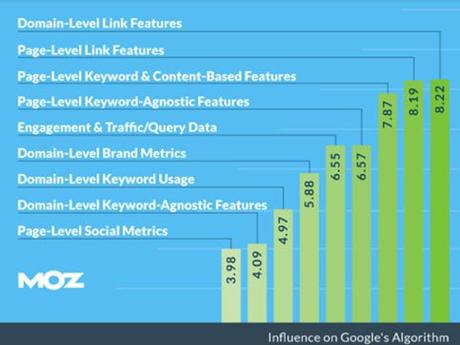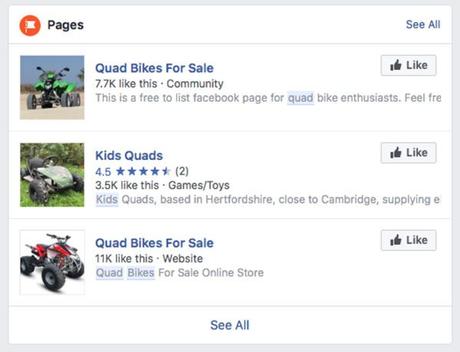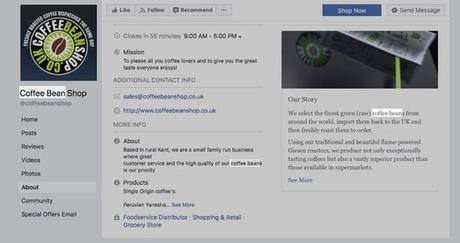Have you ever wondered whether Facebook correlates with your website rankings and ultimately online sales?
In fact, it does, and it may have a more significant impact than you think due to the following factors:
- Link building through social shares
- Driving traffic
- Attracting a readily engaged audience
- Improving keyword rankings via optimisation.
In this post, we’re going to pick apart the relationship between Facebook and SEO, while learning a few things on the way.
Why is Facebook So Important For SEO?
There’s quite a big divide in the online marketing world as to whether social media has any impact on search rankings.
Some claim shares and overall channel performance does nothing, and it’d be a waste of time to focus on it, whereas others stand on the other side of the fence.
This article suggests that social signals have both a direct and indirect effect of SERP results.
They may not have a traditional impact, such as a certain amount of likes increases rankings, but it does have a few exciting and beneficial knock-on effects. It enables you to get your content out there, which drives traffic and users to the website, which Google is a big fan of.

The Influence of Social Signals in Numbers
This may seem a little technical, so let’s break it down step-by-step…
Phase One: Your share your content (unique content)
Phase Two: Others share it (link building)
Phase Three: Friends of friends share the content (more visibility)
Phase Four: All kinds of users are clicking on your links (higher click-through rate)
Phase Five: They are visiting your website and engaging with the content (lower bounce rate)
This is a typical example of what may happen and how it can help translate to positive vibes for your website.
Unique content, link building, visibility, click through rate and low bounce rate are all crucial ranking factors.
So, this may lead you to suspect that Facebook can indirectly impact your search engine rankings.
Do Keywords on Facebook Impact SEO?
Keyword usage is another key ingredient.
Of course, we know how important it is to use relevant keywords on your website.
But, does the same processes apply on Facebook?
Again, there’s no direct result of optimising your social channel for your chosen keywords.
However, when you search for something specific on Facebook, ‘kid quad bikes’ for instance:

There are numerous companies in addition to these three that sell quad bikes for children.
So, again the social channel does not directly correlate to search rankings, but it will drive more relevant and engaged customers to your website.
And this is because:
- Content is relevant to them as they were searching for your specific keywords.
- The content will be more interesting to them as they are willing to spend money.
How to Use Keywords to Optimise Your Account
When you first set up your business account, you are given the option to create a description.
Using your core keywords is crucial if you expect to appear in the searches in the same way that the companies selling kids quad bikes did.
The more time you put into the account, the more traffic you’ll receive.
As an experiment, I typed in, ‘coffee bean shop’ and took the first result and investigated the number of times coffee beans or variations of, appear in the about section.

You can see above that it features quite prominently, and although it’s not an optimal use of the keyword, you can see they’ve created a story and whenever anyone types in coffee bean shop they are in a good position to clean up in their niche.
It’s now quite easy to see the difference between being at the bottom of the pile and the top.
The idea is to attract relevant users to your content to encourage interaction and ultimately more sales.
Both of which have a knock-on effect on the search engine results.
How to Optimise Your Business Page
Now we’ve covered how Facebook and SEO go hand-in-hand, let’s talk about some great ways to optimise your business page for SEO purposes.
Customise Your Page URL
An optimised URL that matches your business name is critical when optimising the page.
Keeping your Facebook URL in step with your business name increases brand recognition.
Custom URLs also make it easier for potential customers to find your brand on Facebook and within the SERPs.
If you leave the custom URL field blank, you’ll automatically be assigned a URL that may be too long and complex.
Here’s how to create a custom URL.
Take Your Time On Your About Section
This section is incredibly important because it’s where people go when they are looking to find that extra piece of info to convince them that you are the company to buy from.
They should be able to find out who you are, what you do and what you stand for.
You should also sprinkle a few of those highly valuable search terms in there to make it easier for your audience to find you.
Here are the steps you must follow:
- Perform in-depth keyword research to find keywords that can impact your business.
- Choose a primary, which must appear in the content a few times, and several secondary phrases that could be added in where possible.
- Create a description that captures everything you need to tell someone your story and add those keywords in there.
- Ensure everything sounds natural; no one likes to read content that doesn’t sound natural.
Business Info
Facebook kindly displays to your customers your location, business hours and any information they’ll need to contact you. So, you need to make sure you fill this out.

Doing this means that your address is added to the Facebook local search index, which means that people looking for what you do in your area will be able to find you.
Optimising Your Blog Posts
Once you’ve optimised the main business page for SEO purposes, you’ll need to carry this information over to your posts and updates.
This translates to using specific keywords to make your posts more visible to searchers and potential customers.
Step 1: Using Relevant Keywords For Visibility
When you search for a particular keyword on Facebook, the results will pull up specific updates that pinpoint those keywords.
Write an excellent description of your update and include the keywords you’d expect people to be searching for. This post, for example, would contain keywords such as SEO, Facebook, Social Media etc.
My job when I post this will be to combine these keywords within a very clickable link.
Step 2: Include a CTA

Just sharing your content on Facebook will probably not be enough to get those clicks you’re looking for, not on its own anyway.
When you share your website content, or even product or service pages, you must give people a reason to click and perform a specific action.
Whatever your desired action is, it’s essential that you create a CTA that people want to click on, as with the above example.
So, now we’ve taken an in-depth look at the relationship between Facebook and SEO, you should be able to begin to make the most of your Facebook account and turn into a machine to create traffic and ultimately more sales.
